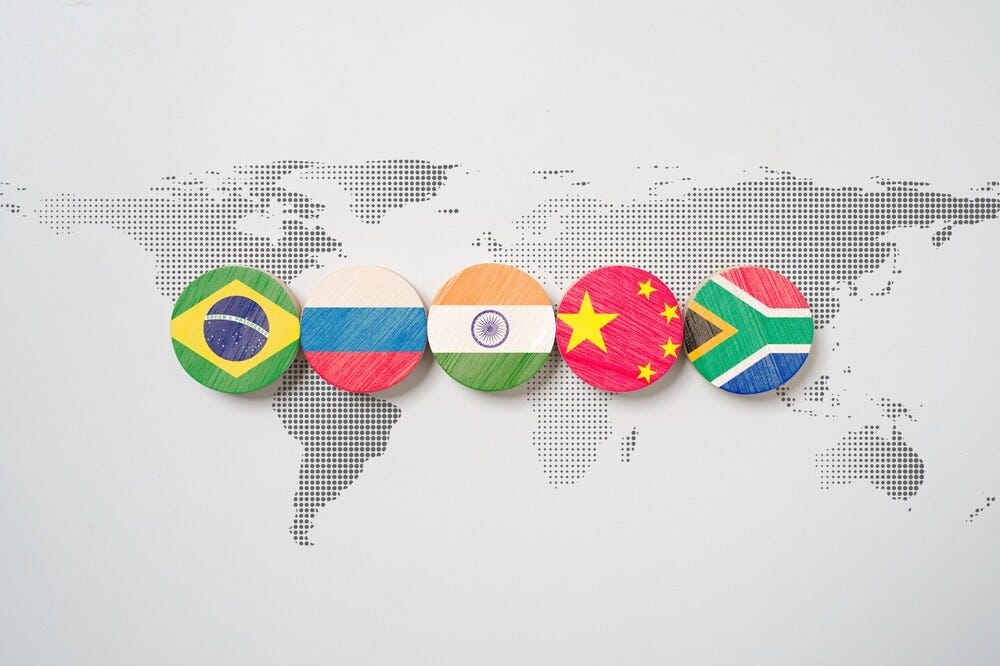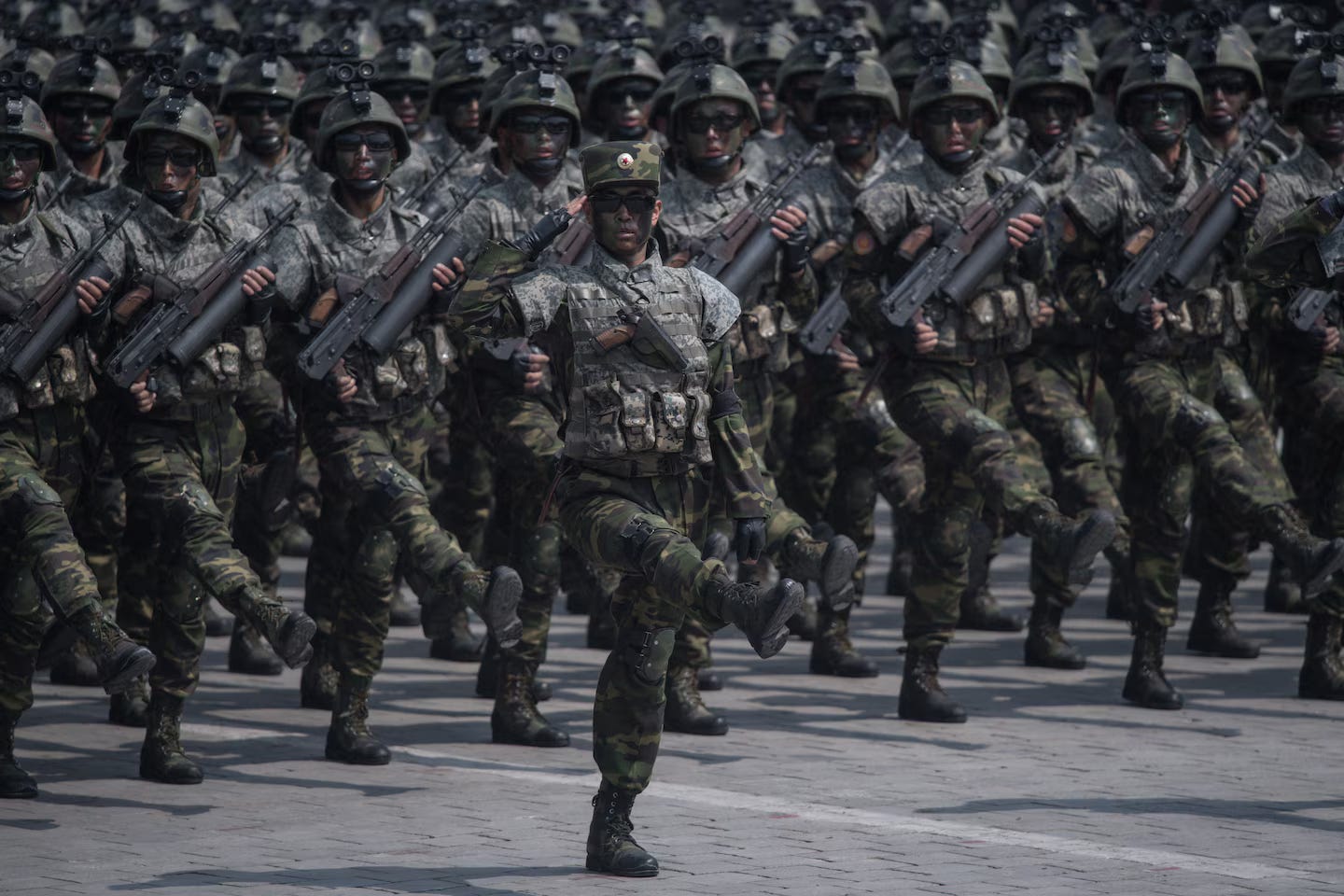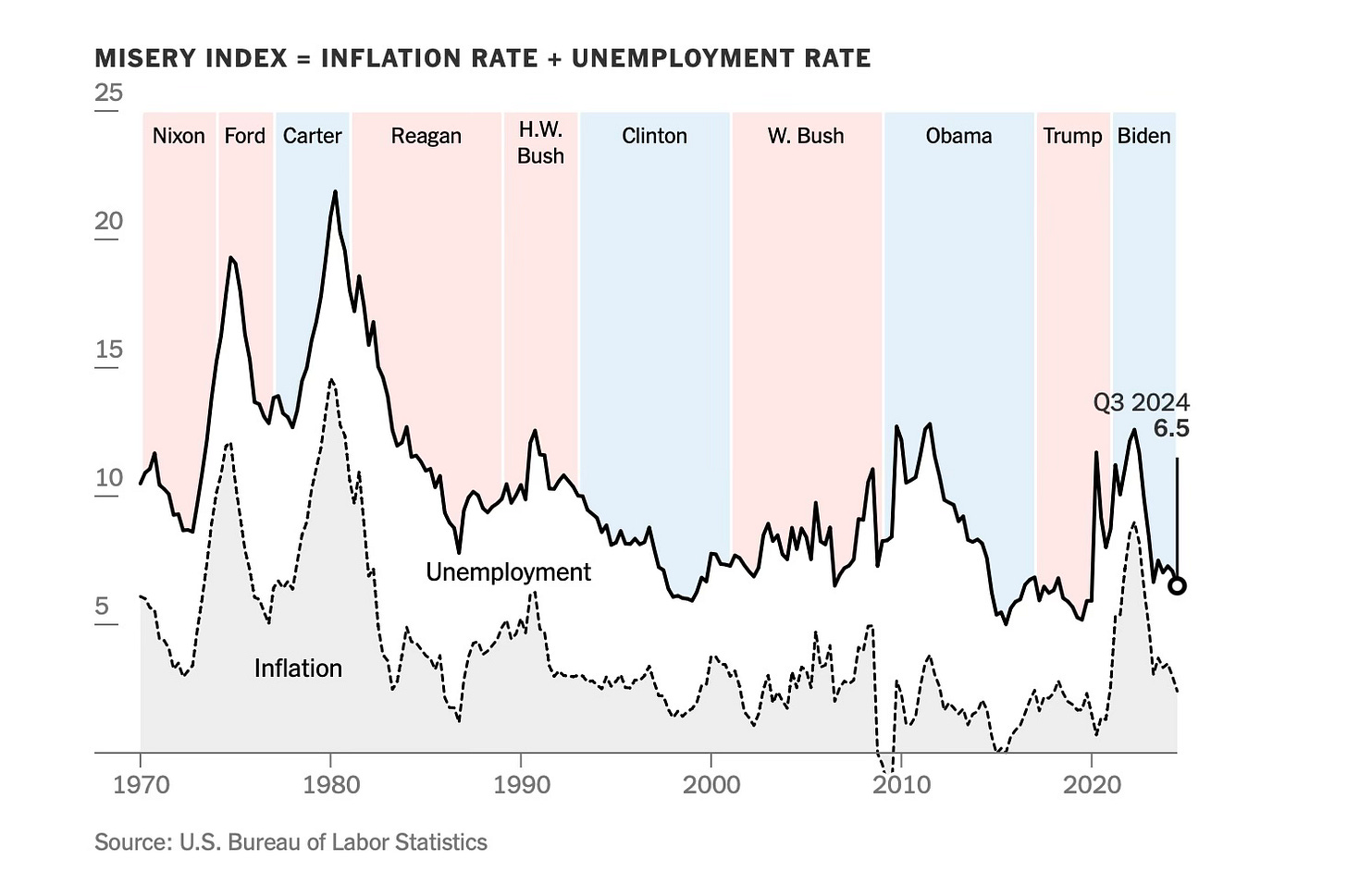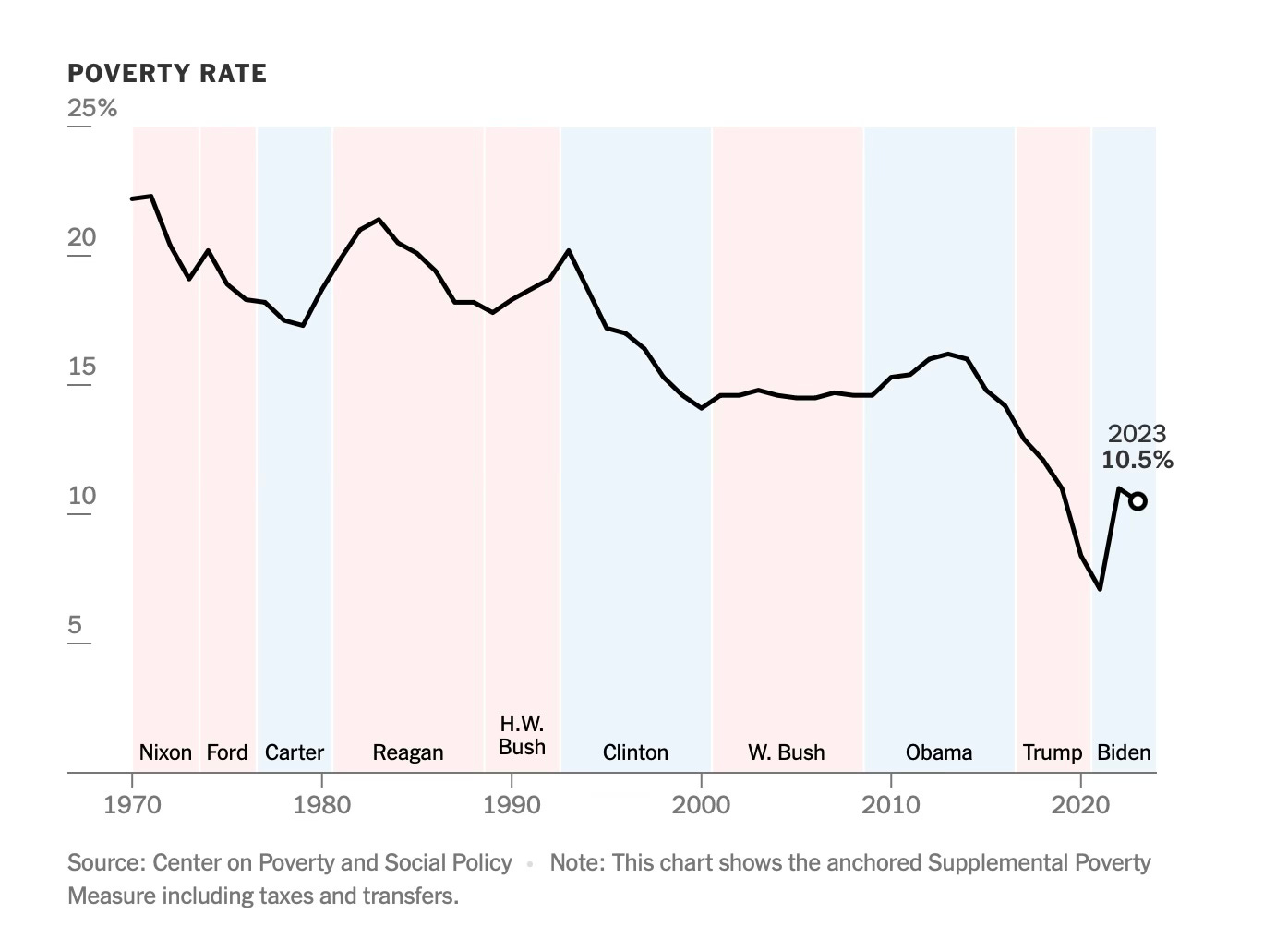1) Refuse to choose
THE TRIBUNE: Brazil won’t join China’s BRI, 2nd BRICS nation after India to do so
The BRICS are a united front set to dismantle the US-led world order … or not.
One data point for “not”: neither Brazil nor India is signing up for any part of China’s Belt and Road Initiative.
India’s gripe has long been the lack of transparency with BRI, along with the far touchier issue of the China-Pakistan Economic Corridor (CPEC) running through Pakistan-occupied Kashmir (POK).
As for Brazil? It says it has its own plans and is open to synchronizing them with China’s but that it’s not just going to sign up like some small nation too eager to read the fine print.
Makes sense to me.
2) An easy choice … for me, at least
NYT: We Poll for Democrats and Republicans. We Agree on Where This Election Is Heading.
PEOPLE: Saoirse Ronan Goes Viral for Her Reaction to Joke About Self-Defense: 'That's What Girls Have to Think About'
If you are asking me to choose between a US rendered in the image of non-college males versus one cast in the manner of college-educated females … I will choose the latter every single time.
I simply expect more common sense and empathy from the latter.
Case in point:
Yes, I know she didn’t go to college. Few actors do.
Still, you get the idea. Would you take her or Mescal/Redmayne for political common sense?
On a related front: I don’t get this fear about a woman president. What exactly has been so great about male presidents to-date?
3) Threats hiding among populace? Get rid of population!
NYT: Israel Demolished Hundreds of Buildings in Southern Lebanon, Videos and Satellite Images Show
The gist:
At least 1,085 buildings have been destroyed or badly damaged since Israel’s invasion targeting the Hezbollah militia, including many in controlled demolitions, a New York Times analysis shows.
This is very much Israel’s Gaza-diminishment strategy being repeated.
If you want to hide among the populace, Hezbollah, then we’ll get rid of the populace, says Israel.
Israel says its ground invasion is aimed at returning Israelis to border communities. The country has accused Hezbollah of placing military infrastructure in civilian areas, and said it had issued advance evacuation warnings to civilians in villages where it said Hezbollah had embedded. Many in the region have fled, with some towns entirely depopulated. The United Nations says 1.4 million people have been displaced across the country.
Israel’s strategy is the Agent Orange of counter-insurgency: You wanna hide in the jungle? Then I get rid of the jungle!
4) The airing of grievances
NYT: We’ve Just Had a Glimpse of the World to Come
More Putin-is-winning analysis:
Surrounded by the leaders of some three dozen nations, Putin looked like the cat who ate the canary — a man who reportedly has the richest man in the world, Elon Musk, on something close to speed dial and has reportedly had private phone calls with the past and possibly future president of the United States, Donald Trump. The secretary general of the United Nations attended as well, raising eyebrows as he made his first visit to Russia in more than two years. In a news conference at the end of the summit, Putin indulged in some digs at his Western tormentors.
“As you can observe, we continue to live and work normally, and our economy is developing,” he said, trotting out Russia’s growth stats, which the International Monetary Fund says will outstrip other developed economies’ this year. For that he can thank, in no small part, the deals that it has inked with fellow BRICS members, most especially India and China, two of the world’s top three oil importers and a crucial source of trade for Russia in the face of sanctions.
Good luck, Putin seemed to say, with your rules-based order. My friends and I are building a different future.
No, I don’t buy it, as I have said here before. It’s a lot of show on Putin’s part, but Russia is a distant third to China and India in terms of economic power and trajectory, and the longer he ruins the Russian economy with this war, the more likely we see regime collapse when he finally goes.
But Lydia Polgreen’s analysis of Putin’s audience targeting is dead-on:
[Putin] is tapping into a very real set of resentments that I have been hearing about with increasing anger and frustration from leaders, scholars and ordinary people across the global south. They hear from the global north a clear set of messages directed at the poor world: Do not cross our borders. Trade on our terms. (Forget globalization; we’re going to focus on building at home.) Help shoulder the burden of reducing emissions and don’t expect much assistance dealing with climate change, despite the fact that we historically caused almost all of the damage. Stand with us on the sovereignty of Ukraine and on condemning Russian indifference to civilian casualties. Listen to our lectures about human rights, democracy and international law, but do not question our support for Israel’s blood-soaked war in Gaza.
There are, of course, nuances and counterarguments to these perceptions. But it is hard to deny the fundamental truth that the global balance of power does not reflect the actual shape of economic and political might or even tilt toward the inevitable direction of travel of that power — South and East — in the decades to come.
Those are two of the best paragraphs of analysis you will encounter nowadays.
5) Billionaires losing their nerves
WAPO: Some billionaires, CEOs hedge bets as Trump vows retribution
Bezos caves on WAPO’s endorsement of Harris (check out his insipid op-ed defending his cowardice). Similar story with different billionaire owning the LA Times.
Trump allies hailed what they say are signs of neutrality from other billionaires. Amazon founder Jeff Bezos, who owns The Washington Post, decided that The Post would no longer endorse presidential candidates, a change announced last week. The Post had an endorsement of Harris in the works. That came just days after Patrick Soon-Shiong, who owns the Los Angeles Times, blocked that paper’s endorsement of Harris.
Musk buying his way into the government — rather brazenly. If I give you enough money, Donald, can I have my way with government regulators?
Jamie Dimon too scared to say he’s for Harris. Gates … not much better.
It’s all pretty sad but predictable: the rich care first and foremost about their own money. That’s how they got rich in the first place.
Trump, meanwhile, is signaling retribution:
“Trump has had no issue calling out political enemies by name and threatening to use the force of government for retribution, and apparently that is intimidating a lot of wealthy targets,” said Brian Riedl, a senior fellow at the Manhattan Institute, a center-right think tank. “It is a very scary sign that government intimidation works.”
Zuckerberg is case in point:
Zuckerberg wrote in a letter to Rep. Jim Jordan (R-Ohio) in August that “my goal is to be neutral and not play a role one way or another — or to even appear to be playing a role.”
Trump said in a coffee-table book published in September that he was watching Zuckerberg closely and that the executive would “spend the rest of his life in prison” if he did anything illegal in this year’s election.
But understand: a Trump win will signal extended rule by the oligarchs. They’ll all do fine by him.
As for the rest of us? Bread and circuses.
6) Internationalized war is not a new concept
REUTERS: North Korea and Russia send political shockwaves with Ukraine war moves
In many ways, Russia-v-Ukraine is a contest between two definitions of conflict:
Ukraine sees this as a conflict between sovereign states.
Russia does not, viewing Ukraine as lost sacred territory.
NATO has been bankrolling Ukraine, and now North Korea is pitching in on Russia’s side, thus internationalizing what Russia views as a civil conflict and what Ukraine views as a state-on-state invasion.
In this manner, I am reminded of the Korean War, and somewhat by the Vietnam War. One side says it is reunifying, the other claims it is being conquered by a hostile state. Outside powers pile in, sensing a proxy war they cannot possibly turn down.
Ukraine's President Volodymyr Zelenskiy said after talks with South Korean President Yoon Suk Yeol on Tuesday that the North Korean moves were sending the war into a new phase.
"This war is becoming internationalized, extending beyond two countries," Zelenskiy said on X.
"We agreed to strengthen intelligence and expertise exchange, intensify contacts at all levels, especially the highest, in order to develop an action strategy and countermeasures to address this escalation," Zelenskiy said.
Yoon told Zelenskiy that if North Korea receives aid from Russia and is able to glean military experience and knowledge from its involvement in the war it would pose a "great threat" to South Korea's security, his office said.
Is this some new and incredible affront to global order? Not in my mind.
Instead, we’re still dealing with the collapse of the Soviet empire and the question of “child custody.” The EU and NATO are now guardians to all of the old Soviet vassal states (Moscow’s step-children at best), and we’re left dealing with the biological kids (harkening back to the old Russian Empire) who, if given the slightest opportunity, want out of that dysfunctional family.
This back and forth will never end so long as Russia remains whole, which is why Russia should not remain whole.
7) “Elite” is in the eye of the beholder
WAPO: North Korea’s elite troops are in Russia to fight Ukraine: What we know
MILITARY.COM: 10,000 North Korean Troops Now in Russia and May Fight on Front Lines, Pentagon Warns
ISW: Russian Offensive Campaign Assessment, October 27, 2024
As “escalation dominance” attempts go, this one is … frankly … palatable compared to nuclear threats that have no teeth but still unnerve:
A former Kremlin official, who is still close to government circles, said the North Korean deployment in Kursk was “an act of revenge after what the Kremlin perceives as an escalation in Kursk” and the decision by Kyiv’s Western allies to allow some strikes inside Russia. “This is another step on the escalation scale.”
The former official, speaking on the condition of anonymity to freely discuss sensitive matters, said it’s “cheaper and politically simpler” for the Kremlin to deploy North Korean forces. The official said he believed that North Korea is receiving much-needed cash for the deployment, as well as military experience and battlefield skills for the troops.
We don’t need to dress up this collaboration as being any more than the “cheaper and politically simpler” option for Putin.
The guy is running out of graveyards and having criminal gangs targeting butter depots. Does he want another big call-up when he can buy fresh troops cheap (20% discount on average soldier’s pay)?
No, he doesn’t, says ISW.
Does that make this an impressive power move? No, it doesn’t.
Is this deployment likely to go well? No, it isn’t:
Although they are among the North’s best trained troops, these soldiers are likely to face difficulties adjusting to modern warfare, said Hyunseung Lee, a North Korean escapee and human rights advocate who trained with the Storm Corps for six months while he served in the North Korean army’s Special Forces.
“They’re not trained with the best technology [or] advanced equipment,” Lee said. “If they were deployed in the war’s battlefield, the Ukrainians will use advanced technologies and drones and missiles. They will just not have had that experience before.”
Lee noted that for the vast majority of these Special Forces soldiers, deployment to Russia will be their first time encountering battle — and the outside world. He added that the soldiers are “victims of a ruthless deal between Kim Jong-un and Putin,” and that “many of them are facing their first real battle, ill-equipped and terrified.”
Again, the truth is that Putin is hard-up and going with the cheapest vendor out there:
"Putin has failed to meet his strategic objectives and, at the end of the day, this shows ... the secretary uses this phrase ... he's 'tin-cupping' to the DPRK, Iran, because he has failed to meet those battlefield objectives," said [Pentagon spokeswoman Sabrina] Singh, referring to Defense Secretary Austin.
ISW’s judgment on all of this is pretty stark:
Russia's economy and war effort is coming under increasing strain, which will pose increasingly acute challenges to Russian President Vladimir Putin's ability to sustain the war over the long term.
Putin’s only true salvation is a Trump win next Tuesday.
8) Fear sells, and plenty are buying
NYT: Trump Says the Country Is ‘Dying.’ The Data Say Otherwise.
Steven Pinker to the usual rescue:
Narratives of national decline have intensified in recent years. Most prominent, of course, is Donald Trump’s vow to “make America great again,” in response to what he has called “a nation that is dying.” But there is also doomsaying on the far left, which sees a “late-stage capitalist hellscape” (to quote the journalist Taylor Lorenz) and is often resigned to voting in protest for a long-shot candidate or sitting out the election altogether.
The doomers can always find ammunition in the news. News, by its very nature, consists of things that happen, and it’s easier for things to go wrong suddenly — a war, a terrorist attack, a hurricane — than to go right suddenly. When things do go right, it usually means either that nothing happens (a country remains at peace, for example) or that improvements creep up a few percentage points every year and compound over time, transforming the world by stealth.
As a result, one can get the impression that the state of the world keeps getting worse when, in fact, it keeps getting better.
An antidote is to look at trends.
Damn your trends!
Biden’s term is hardly the worst anything, with the pandemic seeming to be the key driver over his and Trump’s preceding term.
Good long-term news on poverty, much like with most of the world.
The “American carnage” canard revealed, along with reality that the pandemic seemed to be our “purge.”
Clearly, life was scary during the pandemic, but we’re back to normal now.
Clearly, Trump is not great for happiness — on average, even as he thrills his base.
Trump is also bad for democracy, clearly.
All in all, I come away impressed by just how much the pandemic stressed us … and then we bounced back.
9) A tree falls in the forest
NYT: How Are the World’s Trees Doing? A New Assessment Has Answers.
The answer is … not good.
More than a third of the world’s tree species are threatened with extinction, according to the first comprehensive assessment of trees by the world’s leading scientific authority on the status of species.
The findings, announced on Monday by the International Union for Conservation of Nature Red List, are especially sobering given the amount of life that trees sustain. Countless species of other plants, animals and fungi rely on forest ecosystems. Trees are also fundamental to regulating water, nutrients and planet-warming carbon.
“Trees are essential to support life on Earth through their vital role in ecosystems, and millions of people depend on them for their lives and livelihoods,” Grethel Aguilar, director general of the International Union for Conservation of Nature, said in a statement.
The most vulnerable are the most isolated, naturally. So many tree species that previously found their niches on some island … are going to disappear.
The other big factor? The poleward migration of tree pests damaging temperate forests.
The bright spot?
Brazil has shown that it is possible to curb deforestation with political will and strong enforcement. Now it’s proposing a new fund that would pay developing countries to maintain their forests.
Per my brief: the North sees the issues across Middle Earth and its primary thought is, What is this going to cost me?
But, for Middle Earth? It’s about saving nature as we know it.
10) The climate cycle grows ever more vicious
WAPO: Planet-warming pollution is growing at the fastest rate in history, scientists say
H/T mein Bruder Andy.
The bad news is bad:
Planet-warming pollution in Earth’s atmosphere last year hit the highest levels in human history, scientists announced Monday — a worrying indicator of the world’s failure to curb climate change as global temperatures are on track to hit yet another record high.
Concentrations of carbon dioxide — the most important driver of global warming — are now growing faster than at any time since our species evolved, according to the World Meteorological Organization’s annual Greenhouse Gas Bulletin. The increase can be traced back to stubbornly high rates of fossil fuel consumption, the report said, as well as ecosystems that are becoming more likely to produce emissions and potentially less capable of absorbing excess carbon.
The last two points about ecosystems are the scariest to me: dangerous feedback loops that can explode beyond our expectations. The body can only take so much before it rebels.
“We face a potential vicious cycle,” WMO Deputy Secretary General Ko Barrett said in a statement. “These climate feedbacks are critical concerns to human society.”
Seem real to you?
11) Combating China’s emerging global technological ecosystem
FOREIGN AFFAIRS: The Emerging Age of AI Diplomacy
Keeping it real on any competition for China over AI across the world:
For Saudi Arabia and its neighbor, the United Arab Emirates (UAE), AI plays an increasingly central role in their attempts to transform their oil wealth into new economic models before the world transitions away from fossil fuels. For American AI companies, hungry for capital and energy, the two Gulf states and their sovereign wealth funds are tantalizing partners. And some policymakers in Washington see a once-in-a-generation opportunity to promise access to American computing power in a bid to lure the Gulf states away from China and deepen an anti-Iranian coalition in the Middle East.
They should temper their expectations. Saudi Arabia’s and the UAE’s economic and political relationships with China are more robust than ever, and that is unlikely to change. Although the Gulf states are eager for advanced AI chips that for now only the United States can provide, they also have strong and enduring incentives to hedge their bets, playing the major powers off against each other to extract concessions. When appropriate, the United States and its tech companies should cooperate with the Gulf states on AI. But they should do so within limits and with safeguards—and without deluding themselves that doing so will bring a lasting strategic realignment in the Gulf.
Still, some effort must be mounted:
Where American AI companies see a commercial opportunity, some policymakers in Washington see a strategic one: access to U.S. computing power could be an important carrot to draw countries away from a rapidly expanding Chinese technological ecosystem.
We can’t simply surrender the Global South to China’s tender mercies when it comes to Beijing establishing Orwellian omniveillance systems everywhere its flagship companies gain entry. That access will yield huge big data flows essential to building up AI’s predictive machinery over time. Then there’s the issue of China winning brand loyalty across 3B new middle class-inks and leveraging that into ideological loyalty.
The future of AI is all about massive computing power and massive computing power needs two things: lotsa water and lotsa power. Sure, we can get in a contest with China over who makes the PG players happier over time, but, in the end, we’re going to want to have that production within our borders as much as possible because … quite frankly, we’ve got the “beef” on both scores, particularly when you factor in Canada to the north.
More broadly, if AI systems soon gain the potential to drive explosions in economic growth, design new synthetic bioweapons, or develop impressive new cyber-capabilities, they may disrupt the global balance of power. If that proves to be the case, then the infrastructure that underpins frontier AI systems—in particular, the massive data centers where these models will be trained and hosted—should not be offshored lightly. As the former OpenAI researcher Leopold Aschenbrenner put it in a widely circulated memo: “Do we really want the infrastructure for the [next] Manhattan Project to be controlled by some capricious Middle Eastern dictatorship?”
Simply put, there is little chance of strategic “monogamy” in any US partnership with GCC countries over AI, and, even if there was, would we want to pursue it with authoritarian regimes?
12) AI is being very, very good to me
WAPO: Meet the ‘super users’ who tap AI to get ahead at work
I will admit it: I use AI all the time. It is my go-to partner as I brainstorm and conceptualize and theorize. It is the dream research assistant I always wanted but could never afford.
There is no going back.























